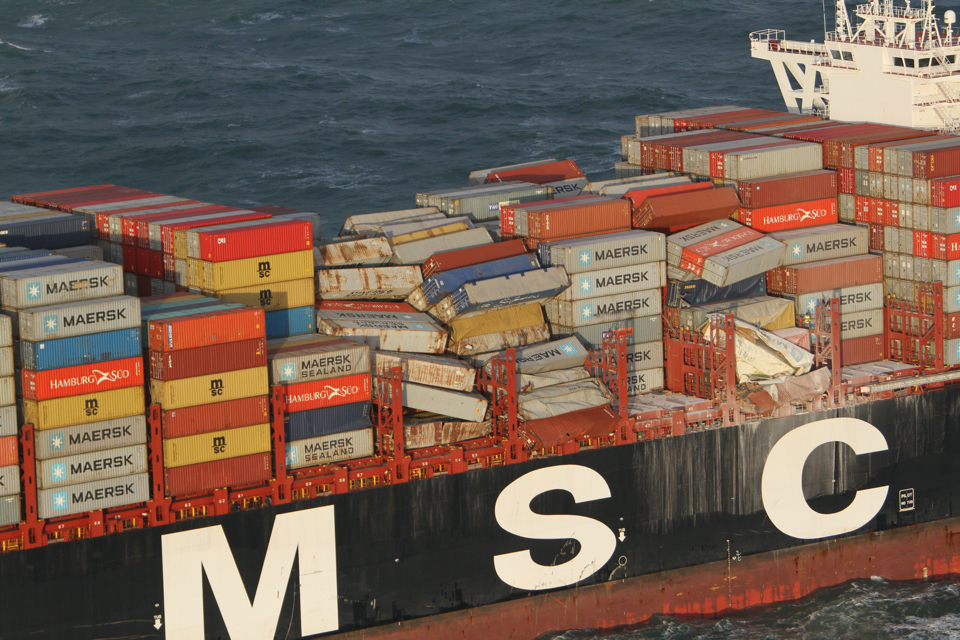The Dutch Safety Board has recommended the Panamanian, German and Dutch Government to submit a proposal to the International Maritime Organization to review the technical requirements imposed on container ships. Such a review could help minimise the risk of the loss of containers.
The Safety Board makes this recommendation in its Shipping Occurrences Report. The Dutch Minister of Infrastructure and Water Management has already expressed her commitment to taking this up with the IMO.
According to the Dutch Safety Board, four hydrodynamic phenomena play a role in containers being lost overboard, as was ascertained after investigations into the MSC Zoe accident in 2019. These are: extreme ship motions resulting in large accelerations and forces on lashing equipment and containers, contact with the seabed, green water and impulsive wave impacts (slamming) against the ship.
Also read: Video: The forces that caused the MSC Zoe to lose containers explained
The report states that proposals for changes via the IMO are lengthy processes, but other options are available in the meantime. The Dutch Ministry of Infrastructure and Water Management has meanwhile taken the first steps towards a follow-up investigation into the loss of containers by smaller ships and in other weather conditions.
Lashing equipment has reached its limit
Other recommendations for the shipping routes above the Wadden Islands are aimed at introducing traffic control on the shipping routes and innovation in relation to the active notification of prevailing weather and wave conditions in the area.
In addition to these developments, the Safety Board says there is a clear role for the worldwide shipbuilding industry and shipping operators. The investigation into the loss of containers by the MSC Zoe demonstrated that the risk of losing containers in periods with heavy rolling is large, because the design limits of lashing equipment are exceeded. Recent occurrences have made it clear that the limits of the lashing systems currently used are quickly approaching. The Board says it is time to critically examine the shelf life of the current systems in combination with the circumstances that occur in practice.
Container losses
In January 2019, the Panamanian container ship MSC Zoe lost 342 containers (19,224 TEU) north of the Wadden Islands. This was not the first time a ship had lost containers on that route, but the amount made a deep impression, according to the Dutch Safety Board. Never before had a ship lost so many containers on this route in one go.
The number of containers lost by the MSC Zoe has since been overtaken by even larger quantities lost, according to the report. On 30 November 2020, the ONE Apus lost 1816 containers (14,052 TEU) and on 16 January 2021, the Maersk Essen lost around 750 containers (13,100 TEU). In both cases, not a single container has been retrieved; the containers and their contents still remain in the Pacific Ocean.
All in all, it is estimated that container ships lost over 2500 containers in the period from last November to January this year. That is almost twice the average of the past twelve years.
Occupational accidents
In addition to container losses, the report also details the number of occupational accidents. According to Jeroen Dijsselbloem, chairman of the Dutch Safety Board, this number can be called high. It concerns 27 incidents on board of ships sailing under the Dutch flag, or incidents that took place within Dutch territorial waters, in the period between 1 May 2020 and 1 November 2020.
These accidents are characterised as ‘serious injury’. A serious injury is an injury suffered by a person that has meant that the person has been incapacitated for work for more than 72 hours within seven days after the date on which the accident took place.
The most common types of occupational accidents are entrapment, impact by liquids, and falling (from a height). The Safety Board believes that greater insight into the nature of these accidents can assist in increased safety awareness among employers, employees and other parties in the maritime sector.
Also read: Dutch Safety Board: River cruise safety inadequate
Picture by the Netherlands Coastguard.








